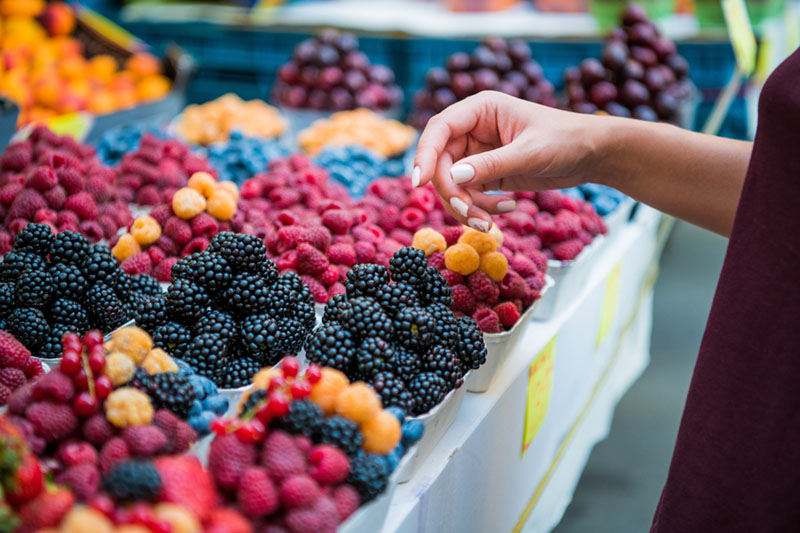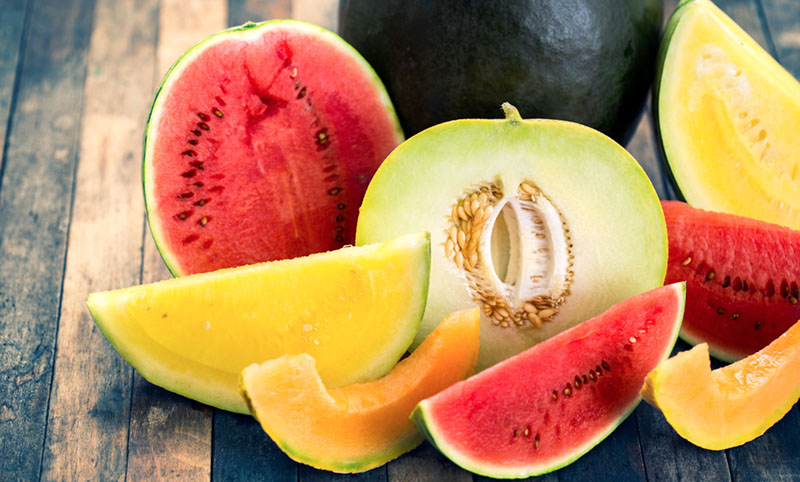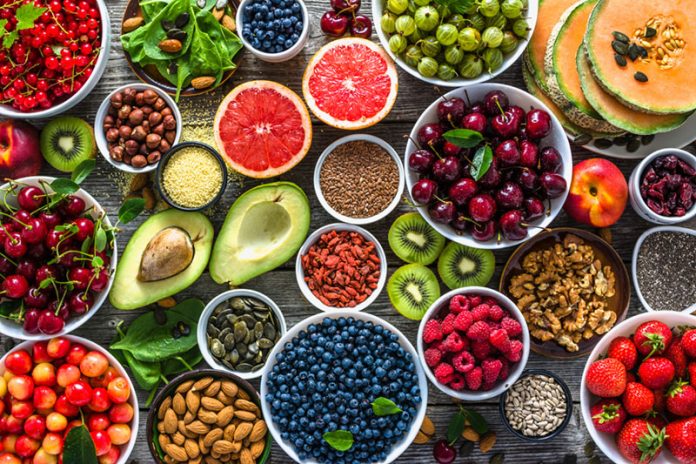It’s no secret that organic food is more expensive than the conventional alternatives. While many of us want to enjoy only natural and organic foods, the higher price tags generally get in the way of us sneaking that bunch of organic bananas into our shopping carts.
This brings us to the million dollar question of modern times: Is organic food worth it?
To prevent any existential dread in the produce aisle, we’ll take a look at what organic food actually is, why it’s better for us and the planet, and how you can shop in an economical and stress-free way when looking for organic food.
What Does it Mean to Be Organic?
According to the USDA, organic means several things: it means that farmland has been free of prohibited substances for at least three years; tillage and cultivation practices have been used to ensure soil fertility; diseases, weeds, and pests are controlled mechanically or with approved biological substances (instead of pesticides); and genetic engineering is prohibited—to name just a few.
To summarize, organic food is friendlier to the planet, the plants themselves, animals, local ecosystems, and the people farming or processing organic products.
Organic food tends to be more expensive because, simply put, it requires more effort along every step of the supply chain. The farming practices are generally more labor intensive and organic food requires segregating ingredients from conventional ones during manufacturing.
Not only that, but the cost to certify a farm or field as organic can be up to thousands of dollars—which has to be paid each year.
While it may feel like robbery to pay several dollars for a small piece of organic cheese or carton of organic eggs, we should realize two things to put these costs in perspective: 1) We’re paying much less (as a portion of our income) for food than we ever have before, and 2) In the US, we’re also paying much less (as a portion of our income) for food than most other countries.
Why the World Needs Organic Food
Once we realize that organic food isn’t as “expensive” as we once thought it was, we might be able to see some more of its merits—namely its positive impact on the environment.
Our current food systems contribute between 19% and 29% of global greenhouse gas emissions—with a lot of this coming from the pesticides and fertilizers used for conventional agriculture.
This type of farming is also associated with a tremendous amount of water use, as well as significant pollution in both water and soil. Not to mention that conventional farms also contribute significantly to land degradation and biodiversity losses.
On the other hand, organic farming is associated with improved biodiversity and more resilience to climate change-related stressors.
It’s also associated with a larger potential for carbon sequestration (i.e. capturing and storing carbon dioxide from the environment). Organic farming is better able to use water responsibly, and can also improve soil health, create wild habitats, restore nutrients, and support pollinator health.
Plus, for anyone who’s eaten an organic carrot or banana, you’ll likely agree that they simply taste better than their conventional counterparts.
Alternative ways of food production also have several benefits from a health standpoint. Organic dairy products and meats have higher concentrations of omega-3 fatty acids and use less antibiotics (which has been associated with antibiotic resistance).
Additionally, long-term consumption of organic foods has been associated with decreased risk for things like metabolic syndrome, infertility, high BMI, and non-Hodgkin’s lymphoma. Organic food has also been shown to contain higher levels of nutrients like phosphorus, magnesium, iron, and vitamin C—plus several important antioxidant phytochemicals.
Then there’s the pesticides to consider. Pesticides have been linked to several types of cancers, an increased risk of ADHD, and a contribution to the risk factors associated with autism—problems you may avoid with organic food.
So, that bag of organic apples may cost $.99 more than the bag of conventionally-grown apples…but isn’t that expense worth it when you consider the hidden costs of not buying organic?
The “Dirty Dozen:” When It’s Really Important to Buy Organic
We get it, not everyone has an extra dollar to spend here and there on organic food, and eating any type of apple is better than no apples at all.
So, if funds are low but you want to shop with your family and our planet in mind, we can jot down two things on our shopping lists: the “Dirty 12” and the “Clean 15” (courtesy of the Environmental Working Group).
The Dirty 12: Fruits and Vegetables that Rank Highest in Terms of Pesticides (Important to Buy Organic)


PRO TIP: If your budget simply doesn’t allow for the purchase of organic produce, don’t let it get in the way of eating produce at all! If you want a little peace of mind about pesticides, you can use a simple baking soda solution to remove pesticides.
Produce soaked for just 15 minutes in a solution of one ounce of baking soda with 100 ounces of water will help to remove pesticide residues.
- Strawberries
- Spinach
- Kale
- Nectarines
- Apples
- Grapes
- Peaches
- Cherries
- Pears
- Tomatoes
- Celery
- Potatoes
The Clean 15: Fruits and Vegetables that Rank Lowest in Terms of Pesticides


- Avocados
- Sweet corn
- Pineapples
- Cabbages
- Onions
- Sweet peas
- Papayas
- Asparagus
- Mangoes
- Eggplants
- Honeydews
- Kiwis
- Cantaloupes
- Cauliflower
- Broccoli
When you make it to the produce section of your local grocery store, keep this in mind. Also, realize that small changes can lead to significant improvements! One study found that just one week on a mostly-organic diet led to a 90% reduction in levels of pesticides found in urine.
If you’re unable to shell out for organic but you’re really craving the sweetness of an apple, perhaps opt for a kiwi instead. Or, if a recipe calls for celery, substitute it with broccoli or cauliflower. Or, better yet, try to grow some of these yourself!
“Dirty” spinach and kale are notoriously easy to grow—and you can be sure that they’re free of pesticides! Check out our list of great gardening websites to help you get started.
Organic Shopping Tips
1. Learn When to Prioritize Organic
There are some people who would do far better to have a mostly-organic diet. For pregnant women, young children, and individuals with a weakened immune system, it’s more important to minimize exposure to pesticides.
It’s recommended to look for organic animal products (meat, milk, and eggs), as well as organic versions of anything you consume a lot of.
2. Buy Local and Seasonal Produce
Not only are locally-grown and seasonal produce better from a health and environmental standpoint, but they also tend to be cheaper, too. They’re a great way to get organic produce at a lower price. Check out a crop share or join a CSA (Community Supported Agriculture) to get produce directly—without the costs associated with a middleman.
Organic certification isn’t always possible—especially for small producers—so you may also be able to find farmers who use organic practices, but don’t have a label. Check out your farmer’s market to find practically organic, pesticide-free products (normally at a cheaper price, too!).
3. Buy in Bulk
When it comes to things like grains, nuts, seeds, tea, coffee, flours, oil, and dried fruit, there’s no cheaper way to get organic than by buying in bulk. Head to your local natural foods store or Whole Foods to check out their bulk bins.
In some cases, you’ll see store-brand items there too, which are generally much cheaper.
The Bottom Line
So, is organic food worth it? This is a question that doesn’t have a straight answer because everyone has different priorities. The science certainly shows that organic food is better from a health and environmental perspective, but if your grocery budget is already nearing its limit, buying healthy food is the most important thing—not worrying about pesticides.
We’d love to know how you feel about organic food. Is it worth it for you and your family? Share your insights and any tips you have for affordable organic food in the comments below!














